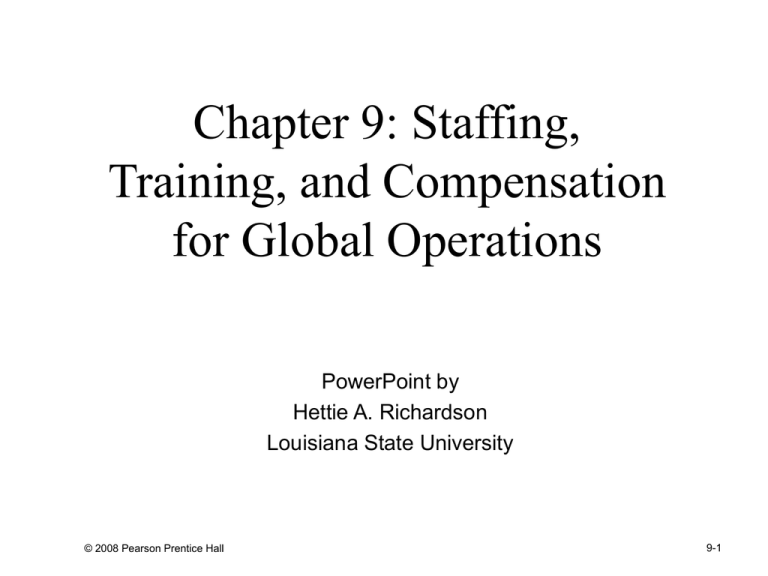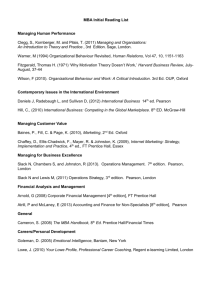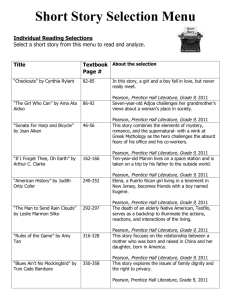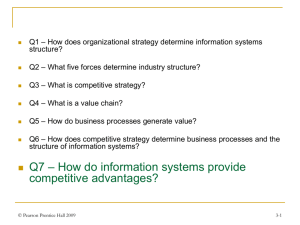
Chapter 9: Staffing,
Training, and Compensation
for Global Operations
PowerPoint by
Hettie A. Richardson
Louisiana State University
© 2008 Pearson Prentice Hall
9-1
Opening Profile: Training the
“Toyota Way”
Making problems visible
Toyota Institute
Too much growth to maintain the Toyota
Way?
© 2008 Pearson Prentice Hall
9-2
International Human Resource
Management (IHRM)
Functions
Recruitment and selection
Training and development
Compensation and performance
management
Management of expatriates
Again, fit is crucial
© 2008 Pearson Prentice Hall
9-3
Staffing for Global Operations
Ethnocentric staffing approach
Used at internationalization stage of
strategic expansion, with centralized
structure
Parent-country nationals (PCNs)
Polycentric staffing approach
Often used with multinational strategy
Host-country nationals (HCNs)
© 2008 Pearson Prentice Hall
9-4
Staffing for Global Operations
Global staffing approach
Third country nationals (TCNs)
Transpatriates
Regiocentric staffing approach
Can produce a mix of PCNs, HCNs, and
TCNs
© 2008 Pearson Prentice Hall
9-5
Strategic Mode, Organizational
Variables, and Staffing Policy
Aspect of
Enterprise
Strategic
Orientation
Ethnocentric
International
Expatriates
Perpetuation used for key
positions
Evaluation
and control
Rewards
Home
standards
applied
High at home;
low in
subsidiaries
© 2008 Pearson Prentice Hall
Polycentric
Multidomestic
Regiocentric
Regional
Global
Transnational
Locals used for Regional
key positions
people used
locally
regionally
Best people
used
anywhere
Determined
locally
Determined
regionally
Globally
integrated
Wide variation
Based on
contribution to
regional
objectives
Based on
contribution to
local and
worldwide
objectives
9-6
Expatriate Selection
Five categories of success: job factors,
relational dimensions, motivational state,
family situation, and language skills
Predictors of expatriate success: Stress
tolerance and extraversion
© 2008 Pearson Prentice Hall
9-7
Expatriate Performance
Management
Selection based on headquarters criteria
Inadequate preparation, training, orientation
Alienation or poor support from headquarters
Inability to adapt to the local culture
© 2008 Pearson Prentice Hall
9-8
Expatriate Performance
Management
Problems with spouse and children
Insufficient compensation and financial
support
Poor programs for career support and
repatriation
© 2008 Pearson Prentice Hall
9-9
Expatriate Training and
Development
China: Eating duck tongue and pigeon head
Brazil: Home phones don’t work
India: Pervasive poverty
Indonesia: Rent paid 2-3 years in advance
Japan: Doctors reveal little to patients
© 2008 Pearson Prentice Hall
9-10
Expatriate Training and
Development
Japanese expatriate planning:
Selection based on long-term knowledge of
executives and their families
Use of longer assignments (e.g., 5 years)
Extensive headquarter support
© 2008 Pearson Prentice Hall
9-11
Cross-cultural Training
Culture shock
Honeymoon
Irritation and hostility
Gradual adjustment
Biculturalism
Subculture shock
© 2008 Pearson Prentice Hall
9-12
Training Techniques
Area studies
Sensitivity training
Culture assimilators
Field experiences
Language training
Host-family
surrogate
© 2008 Pearson Prentice Hall
9-13
Corporate Programs to Develop
Global Managers
ABB rotates 500 managers to different
countries every 2-3 years
Pepsi brings foreign managers to the US for
one-year assignments
British Telecom uses informal mentoring
between expatriates and potential assignees
© 2008 Pearson Prentice Hall
9-14
Management Focus: Citibank
Gives Advice on Career Planning
Two-thirds of Citibank’s management team
have international experience
Options include expatriate assignment, shortterm assignments, jobs with cross-border
interactions, and global task forces
© 2008 Pearson Prentice Hall
9-15
Integrating Training with Global
Orientation: Export Stage
Training need: Low to moderate
Content: Interpersonal skills, culture,
customer values, business behavior
HCNs: Train to understand parent-country
products and policies
© 2008 Pearson Prentice Hall
9-16
Integrating Training with Global
Orientation: Multidomestic Stage
Training need: Moderate to high
Content: Interpersonal skills, culture,
technology transfer, business practices
and laws
HCNs: Familiarize with production and
service procedures
© 2008 Pearson Prentice Hall
9-17
Integrating Training with Global
Orientation: Multinational Stage
Training need: High moderate to high
Content: interpersonal skills, two-way
technology transfer, corporate value transfer,
strategy, stress management, culture,
business practices
HCNs: Training in technical areas, products
and services, corporate culture
© 2008 Pearson Prentice Hall
9-18
Integrating Training with Global
Orientation
Training Need: High
Content: Global corporate operations,
corporate culture transfer, customers, global
competitors, strategy
HCNs: Training in proficiency in production
and efficiency systems, corporate culture,
business systems, global conduct policies
© 2008 Pearson Prentice Hall
9-19
Factors Helping Integration of
Expatriates and Local Staff
Forming close working relationships
Learning local language
Transferring technical/business knowledge
Integrating into local life
© 2008 Pearson Prentice Hall
9-20
Factors Hindering Integration of
Expatriates and Local Staff
Not using team concept
Not learning local language
Arrogance
Spouse/family adjustment problems
© 2008 Pearson Prentice Hall
9-21
Compensating Expatriates
DuPont’s Global Transfer Center of Expertise
creates perceptions of equity and goodwill
Companies are looking for ways to cut the
costs of expatriate assignments
The need to reconcile parent- and hostcountry practices adds complexity
© 2008 Pearson Prentice Hall
9-22
Compensating Expatriates
The balance sheet approach
Tax equalization
Components of the compensation package:
Salary, taxes, allowance, benefits
© 2008 Pearson Prentice Hall
9-23
Training HCNs
Facilitates indigenization
Links successful corporate culture and local
culture
Facilitates e-business adoption
© 2008 Pearson Prentice Hall
9-24
Training Priorities for E-Business
Development
Addressing security and privacy concerns
Developing a business plan
Developing an e-business strategy
Understanding electronic payment methods
Financing e-business initiatives
© 2008 Pearson Prentice Hall
9-25
Management Focus: Success!
Starbucks in Beijing
Challenges recruiting, motivating, and
retaining Beijing managers
Chinese recruits want training and
advancement opportunities more than money
© 2008 Pearson Prentice Hall
9-26
Management Focus: Success!
Starbucks in Beijing
Recruits are trained in management and in
Starbucks’ culture
Three months in Seattle
Make coffees in a real store
Training, and resulting trust and
participation, also serve as motivators
© 2008 Pearson Prentice Hall
9-27
Compensating HCNs
Eastern Europeans require more cash than
Americans
Compensation in Japan is becoming more
Westernized
Chinese workers resist pay for performance
© 2008 Pearson Prentice Hall
9-28
Comparative Management in
Focus: Compensation
“Best Practices”
Regional
Clusters
Country
Specific
Incentives not
too large, pay
based on
individual
performance,
reduce seniority
pay
Asian and Latin
countries use
more seniority
pay, group/team
pay, and pay for
future goals
US uses less
incentives than
expected,
China and
Taiwan use
more
© 2008 Pearson Prentice Hall
9-29
Comparative Management in
Focus: Selection
Regional
“Best Practices”
Clusters
Anglo cluster
focuses on
“Getting along
technical skill,
with others” and
work experience;
“Fit with
Korea, Japan,
corporate
and Taiwan
values”
focus on work
experience
© 2008 Pearson Prentice Hall
Country
Specific
Japan looks at
a person’s
potential; Korea
relies on
employment
tests; Taiwan
relies on
interviews
9-30
Comparative Management in
Focus: Performance Appraisal
Regional
“Best Practices”
Clusters
Expression used
Could be better little in Asian
in all countries; countries; in
emphasis on
Latin America
development
the
and
administrative
documentation purpose is
important
© 2008 Pearson Prentice Hall
Country
Specific
In Taiwan the
administrative
purpose is
important
9-31
Comparative Management in
Focus: T&D
Regional
“Best Practices”
Clusters
Softer practices
Used to
used in Anglo
improve
cluster but more
technical skills
use is desired;
and,
Latin cluster
increasingly,
desires more use
team building
of all practices
© 2008 Pearson Prentice Hall
Country
Specific
In Mexico, T&D
is a reward; US
is outsourcing
more; Korea
uses team
building
extensively
9-32
Comparative Management in
Focus: Relation to Strategy
“Best Practices”
Regional
Clusters
Country
Specific
T&D and
performance
appraisal most
closely linked to
organizational
capability
Low cost and
differentiation
strategies linked
to HRM in Asian
cluster
No linkages
between
organizational
capability and
HRM in Mexico
© 2008 Pearson Prentice Hall
9-33







